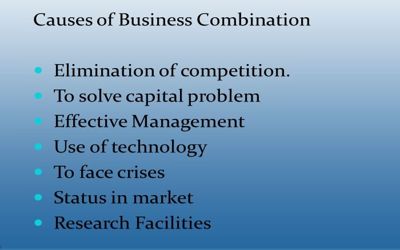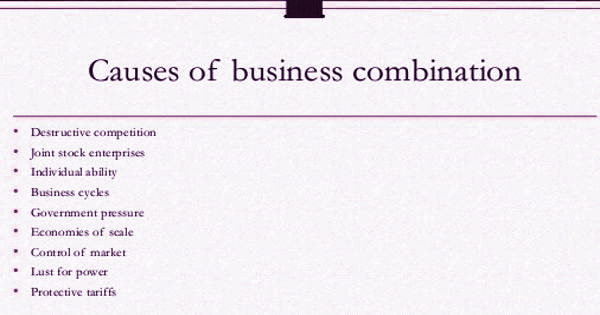Causes for Business Combination
A business combination is a transaction in which an acquirer gains control over a business. These Combinations are the result of a variety of causes. It can be aptly defined as an amalgamation of the assets of two or more business entities for their consolidation as a single entity under single ownership. The causes are highly complex and so it is very difficult to classify them under definite categories.
Although the business combination is primarily formed for achieving a common (single) goal, it may also be formed keeping in mind the following reasons:-
- Elimination of Competition
Large-scale production and intense competition have become the rule of the present-day economy. Due to hard competition among the firms’ rate of profit decreases. Some firms may suffer a loss also. So the industrialists feel pleasure in setting up a combination to avoid the competition. Therefore, the only alternative available to the industrialists is the elimination of competition, which could be possible only through a business combination.
- To Solve Capital Problem
Small units of production face the problem of capital shortage. They cannot expand their businesses. As a result, small units may form a combination to overcome this problem.
- To Achieve Economies
Some small units combine themselves to achieve the economies of large scale production advantage. It helps to purchase the raw materials at low prices and sell more product which would increase the profit
- Effective Management
Generally, small units are unable to hire the services of experts and experienced managers. So small industrial units combine themselves to hire the services of effective management.

- Tariff Facilities
The tariff policies of different countries have also furthered the causes of the combination movement. To compete with external firms, some industrial units combine themselves. The protection offered by the state resulted in the establishment of a number of business units. The government also imposes heavy duties to protect domestic producers. Consequently, competition amongst them became tense and the need for the business combination was felt.
- Uniform Policy
All the units adopt uniform policy due to business combinations. It regularizes the business activities of all the units.
- Use of Technology
Technological development also paved way for large-scale operations. The business combination can use the latest technology and new methods of production because its sources are sufficient. Small units with limited financial resources were found unable to compete with bigger ones. In contrast, a single unit cannot do so. Moreover, the adoption of modern techniques required huge capital investments, which small units could not provide.
- To Face Crises
It is very difficult for the small industrial units to face crises in the days of inflation and deflation. So the small units combine themselves to face these problems easily.
- Growth of Joint Stock Companies
The growth of Joint-stock companies has also made it possible for various industrial units to form combinations. Basically, the company form of the organization itself is a type of combination. Large companies with huge capital were able to control comparatively small companies by subscribing to their shares.
- Demand and Supply Balance
A business combination is very useful in controlling overproduction. The tendency of business activities to fluctuate regularly between booms and depressions gave a fillip to business combinations. It adjusts the supply according to the demand of the market. So overproduction cannot take place, and prices remain stable. Particularly during periods of depression, new units cannot enter into the industry and even the existing small and inefficient units cannot survive.
- Transport and Communication Development Activities
The development of transport facilities accelerated the growth of large-scale undertakings. It has made economic activities fast. Now there is close contact with a businessman with the others. So it has also contributed to the growth of combination. The large undertakings began to absorb smaller units to cater to the needs of the local market.
- Research Facilities
Small firms cannot set up the research department, while through business combination, these facilities can be enjoyed.
- Patent Laws
Business Combination has also been fostered by patent laws. The inventors were given an exclusive right to the use of their inventions. This statutory right also furthered the combination movement.
- Economic Instability
In the case of economic and political instability, there is a chance of loss at every moment. To reduce the risk, small industrial units combine themselves.
Information Source:
















